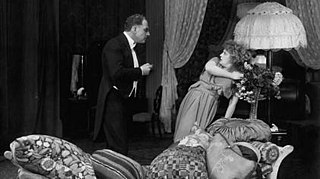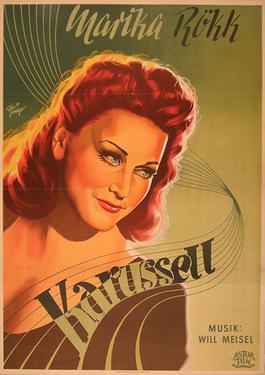Related Research Articles
UFA GmbH, shortened to UFA, is a film and television production company that unites all production activities of the media conglomerate Bertelsmann in Germany. The original UFA was established as Universum-Film Aktiengesellschaft on December 18, 1917, as a direct response to foreign competition in film and propaganda. UFA was founded by a consortium headed by Emil Georg von Stauß, a former Deutsche Bank board member. In March 1927, Alfred Hugenberg, an influential German media entrepreneur and later Minister of the Economy and Minister of Agriculture and Nutrition in Adolf Hitler's cabinet, purchased UFA and transferred ownership of it to the Nazi Party in 1933.

Anna Boleyn, also known as Deception, is a 1920 German historical film directed by Ernst Lubitsch. It stars Henny Porten as Anne Boleyn and Emil Jannings as King Henry VIII.

Gertrude Welcker was a German stage and silent film actress. She appeared in 64 films between 1917 and 1925.

The Wandering Image is a 1920 German silent drama film directed by Fritz Lang and starring Mia May, Hans Marr and Rudolf Klein-Rogge. It is also known by the alternative titles of The Wandering Picture and The Wandering Shadow.

Lady Hamilton is a 1921 German silent historical film directed by Richard Oswald and starring Liane Haid, Conrad Veidt and Werner Krauss. The film depicts the love affair between the British Admiral Lord Nelson and Lady Emma Hamilton. It was based on two novels by Heinrich Vollrath Schumacher. A copy of the film exists in a Russian film archive.

Peter the Pirate, also known in English as The Sea Wolves, is a 1925 German silent historical adventure film directed by Arthur Robison and starring Paul Richter, Aud Egede-Nissen, and Rudolf Klein-Rogge. It was based on a novel by Wilhelm Hegeler. Leni Riefenstahl was offered the role of female lead by producer Erich Pommer, but after doing a screen test she eventually turned it down.
Prussian films were a cycle of historical films made in Germany during the Weimar (1918–1933) and Nazi (1933–1945) eras noted for their general glorification of Prussian history and its military. The films are set during the eighteenth and nineteenth centuries. They particularly focused on Frederick the Great, who ruled Prussia from 1740 to 1786 greatly expanding its territory. The films were extremely popular with German audiences and an estimated forty four were produced by the end of the Second World War.
Whitechapel is a 1920 German silent crime film directed by Ewald André Dupont and starring Guido Herzfeld, Hans Mierendorff, and Otto Gebühr. The film was set around a variety theatre in London's East End suburb of Whitechapel.
Lola Montez, the King's Dancer is a 1922 German silent historical drama film directed by Willi Wolff and starring Ellen Richter, Arnold Korff, and Fritz Kampers. It portrays the life of Lola Montez. The film was produced by Richter's own production company, but was released by the dominant German distributor UFA.

Wood Love is a 1925 German silent comedy film directed by Hans Neumann and starring Werner Krauss, Valeska Gert and Alexander Granach. It was an adaptation of William Shakespeare's A Midsummer Night's Dream.

The Mysterious Mirror, aka The Mystic Mirror is a 1928 German silent fantasy film directed by Carl Hoffmann and Richard Teschner, and starring Fee Malten, Fritz Rasp and Rina De Liguoro. The film was about a magic mirror which allowed the person looking into it to see his or her future, a theme that appeared similarly in the 1945 British horror film Dead of Night. The magazine Film und Volk, which was invariably hostile to UFA releases, described it as "about the limit of what an audience could be expected to tolerate in the way of stale Gothic Romance and unlikely psychology".

Katharina Knie is a 1929 German silent drama film directed by Karl Grune and starring Eugen Klöpfer, Carmen Boni and Adele Sandrock. It is based on the 1928 play of the same title by Carl Zuckmayer. It was shot at the Babelsberg Studios in Berlin The film's art direction was by Robert Neppach and Erwin Scharf. It was distributed by the Munich-based Bavaria Film.

The Woman One Longs For is a 1929 German silent drama film directed by Curtis Bernhardt and starring Marlene Dietrich, Fritz Kortner and Frida Richard. It was based on the novel of the same title by Max Brod, published in Vienna by Paul Zsolnay Verlag in 1927. Made partly at the Babelsberg Studios and the Terra Studios, the film premiered on 29 April 1929 at the Mozartsaal in Berlin. The film's art direction was by Robert Neppach. It is also known by the alternative title The Three Lovers.

The Women House of Brescia is a 1920 German-language silent film directed by Hubert Moest. The film's alternative name was The House of Pillory. The film was considered highly controversial for the depiction of prostitution. The film's story was set in medieval Europe during the fourteenth century. The film was based on Karl Hans Strobl's novel Das Frauenhaus von Brescia. The Pillory houses were the places where enemy women captured during wartime were imprisoned so that the people could exploit them as they wished. The depiction of prostitution was the basis for the picture's rejection by the British Board of Film Classification in 1921 and its being banned in Germany.

By a Silken Thread is a 1938 German drama film directed by Robert A. Stemmle and starring Willy Fritsch, Carl Kuhlmann and Käthe von Nagy. The film was intended to be an exposure of "crooked Jewish capitalists" in line with Nazi racial policy of the era. It was shot at the Babelsberg Studios of UFA in Potsdam. The film's sets were designed by the art director Otto Hunte.
The Dancer is a 1919 German silent film directed by Carl Froelich and starring Lil Dagover.

Carousel is a 1937 German musical film directed by Alwin Elling and starring Marika Rökk, Georg Alexander, and Paul Henckels. It was shot at the Babelsberg Studios of UFA in Potsdam. The film's sets were designed by the art directors Artur Günther and Karl Vollbrecht.

Hans Trutz in the Land of Plenty is a 1917 German silent fantasy film directed by and starring Paul Wegener and also featuring Lyda Salmonova and Ernst Lubitsch. It was one of a trilogy of fairytale-inspired films made by Wegener, along with Rübezahl's Wedding and The Pied Piper of Hamelin.
The Mask is a 1919 German silent crime film directed by Ewald André Dupont and starring Max Landa, Lil Dagover and Gertrude Welcker.

Veritas Vincit is a 1919 German silent historical film directed by Joe May and starring Mia May, Johannes Riemann, and Magnus Stifter. It was made as an epic in three episodes, similar to D. W. Griffith's Intolerance. The first takes place in Ancient Rome, the second during the Renaissance and the third shortly before the First World War. Although not released until Spring 1919, it had been made during the final months of the war the previous year.
References
- ↑ Kreimeier p.44